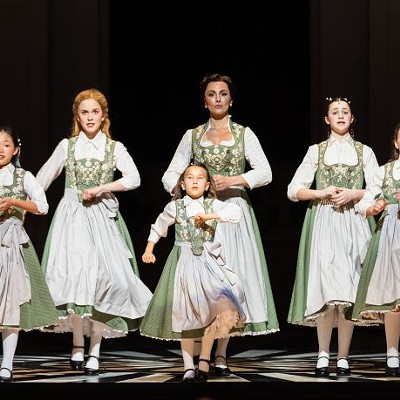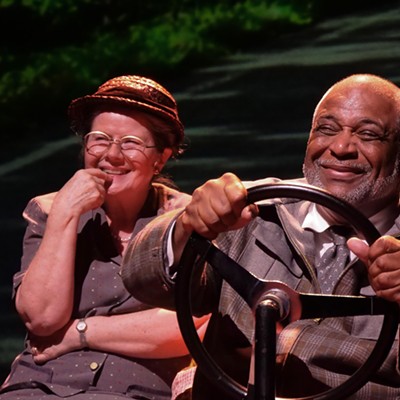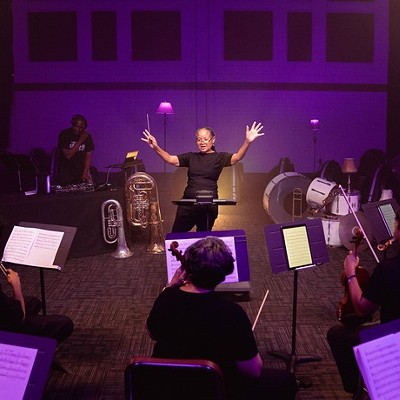The set-up:
Validation is a powerful thing. We all crave it in some form, whether we're artists or CEOs. In The Spiritualist, playing now at Stages Repertory Theatre in its Texas premiere (and second ever production), an English widow goes as far as to validate her musical creations by claiming that composers use her as a vessel for their compositions. As she repeats throughout the play: the music would be inconsequential if it came from her own mind. If it's from a famous genius, it has value.
Helpfully, the geniuses in question are dead, and only communicate with her. If that wasn't intriguing enough, a version of this story actually occurred in England in the 1970s, when Rosemary Brown (1916-2001) became a minor celebrity for her alleged ability to channel the masters.
The execution:
This set-up makes our heroine, Rosemary Dunn (Amy Herzberg), sound either insane, pathetic or deviously money-hungry. But the Rosemary of the play is humble and shy; she didn't ask for this attention, and she doesn't want to appear ridiculous. She's English, after all. And besides, whether or not we believe her is not the point.
Playwright Robert Ford has spun the true story into a piece that is at once riotously funny, musically engaging -- Herzog actually plays the piano live onstage -- and sweetly complex, appealing to the audience's intellect and prompting conversation about how we value and define art in a commercial world, as well as our own self-worth. This inspired story unfolds somewhat awkwardly at the beginning -- but it's worth it to reach the raucous performance near the end of Act One, when the visitation of a dead rock star takes Rosemary's stardom to the next level and incites the character development in act two.
Stages has crafted an experience that is inviting and positive from the moment a person enters the theater. Torsten Louis' scenic design makes excellent use of Stages' intimate arena space, the only permanent fixtures being an upright piano and a small kitchen table set-up. Director Seth Gordon has instructed his actors well; they readjust and move enough so that they don't have their backs to the audience for an excessive amount of time, but not so much that it feels unnatural.
Herzberg makes us root for Rosemary with her perplexed looks, church-lady singing and genuine service to her visiting spirits. The five other cast members are just as important, with characters of her main squeeze composer Franz Liszt (Justin Doran) and American reporter Roy (Jack Young) changing as much as she does by the final curtain. Doran charms and flounces in a pleasing contrast to the other characters' modern proclivities, and Young is the jaded bastion of a failed American dream we need to challenge Rosemary's supernatural tendencies. It would be easy to give Roy a stock personality, but neither the playwright nor the actor succumbs to that.
Elaine Robertson skillfully distinguishes her three characters -- a shrewd music critic, spiritual housewife, and composer in her own right Clara Shuman -- and keeps the rhythm and laughs flowing whenever she's onstage. James Belcher slays as the giggly, quintessentially '70s British host of "Music Talk," the only venue where Rosemary performs outside of her home. Belcher also appears briefly as Beethoven in an enjoyable but ultimately unimportant sequence that only marginally advances Liszt's and Rosemary's growth. Jon L. Egging did well in portraying bottom-line-focused yet still affable music producer Peter Clifton. His arc picks up steam in the second act, when his conversations with Roy show him as a more effective commercial foil to Rosemary's earnestness. Egging's turn as a young rock star effectively turned the play around, and I am grateful for his energy and commitment to that portrayal.
Playwrights face interesting challenges when working with a true story. Robert Ford made a few puzzling choices that were not enough to nullify the brilliance of what worked, but did dull the experience where it could have been enhanced. For example, in the real story, Rosemary claimed that Liszt first appeared to her when she was seven years old in a long dress-like robe. She recounts this in the stage show more than halfway through the first act. Why, then, did Liszt appear in those robes, looking more like Raiden from the 1995 film version of "Mortal Kombat" than anything else, in the very first scene, when Rosemary is clearly a grown woman? (That sin of a robe by costume designer Tiffani Fuller is easily forgiven, given her flawless design for the rest of the play.) Conversely, one interesting detail in the play (that is not true to real life) is that Rosemary's husband died in WWII almost immediately after they married. This would be a fascinating segue to her connection with the spiritual world, but it's barely explored at all. Why add that intriguing angle and then ignore it?
The verdict:
The answer is that, despite our hunger to analyze Rosemary's subconscious motives, we are not meant to dwell on whether or not the spirits are real, or the concrete reason for their appearances. They're real to her, and that's enough. The play's true questions involve artistic validity, self-worth and commercial benefit, and will leave audiences with plenty to discuss.
The fact that Ford saw fit to adapt this story speaks volumes, and he is certainly the one to do it, given his musical background (he holds a master of music degree from Yale). Construction gripes are minor when considering The Spiritualist as a whole, with its rollicking, thoughtful and touching charm coupled with Stages' appealing production aesthetics and the actors' fine performances. All will find something to enjoy in this rare new show, and leave the theater humming.
"The Spiritualist" runs through May 24 at Stages Theatre, 3201 Allen Parkway, Wednesdays and Thursdays at 7:30 p.m., Fridays and Saturdays at 8 p.m., and Sundays at 3 p.m. Purchase tickets at stagestheatre.com or call 713-527-0123. $19 - $65.





